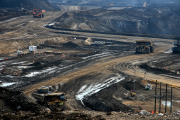See a PDF of the climate change segment, and op-ed, that was published in the Globe and Mail (December 7, 2012), here.
How much have you heard about British Columbia’s carbon tax lately? If the answer is “nothing at all,” then you’re in good company. Whether it is the federal government’s ongoing campaign against carbon taxes or the lack of discussion in other parts of the country, most Canadians hear very little about the fact that the country’s west coast is home to one of the world’s best climate policies.
If we’re to do our fair share to fight global warming, this situation needs to change. B.C.’s policy can provide a starting point for an adult conversation on climate change and the potential role that carbon taxes could play. In that spirit, here are a few notes on what B.C.’s experiment can offer the rest of the country.
B.C.’s carbon tax was implemented four years ago and by all accounts is accomplishing what it was intended to do — namely, reducing greenhouse gas emissions as efficiently as possible. The tax makes it more expensive to burn fossil fuels such as coal or gasoline, adding about seven cents per litre at the pump. The higher prices encourage decisions that result in fewer fossil fuels being burned. All of the money collected from the tax ($1.2 billion in 2012) is used to lower other taxes.
The tax is having the desired effect. While change didn’t happen overnight, research shows that per capita demand for gasoline, diesel and the other petroleum products subject to the tax has dropped significantly since the tax was implemented. Meanwhile, per capita use of the same fossil fuels has increased slightly throughout the rest of the country during the same period.
Local governments are seeing the tax tip the scales in favour of community projects that use renewable energy or reduce energy demand. Based on public opinion polling, just under half (47%) of British Columbians have recently started driving less frequently. Of those, slightly more than half (51%) did so to reduce the carbon tax they pay.
Doomsday economic predictions have proven to be well off the mark. In fact, B.C.’s per capita gross domestic product has slightly outperformed the rest of Canada in the period since the carbon tax was implemented. Many business leaders and economists, from B.C. and around the world, have praised the tax’s design for its simplicity.
B.C.’s carbon tax also provides political lessons, and those may be among its most important. The policy survived the 2009 provincial election — an election that put carbon taxes on centre stage. Now, it looks set to survive a second election with both the government and opposition supporting the tax. With the $1.2 billion it generates — about six per cent of provincial tax revenue — the carbon tax is becoming more and more entrenched within the province’s fiscal framework, and in the psyche of British Columbians.
None of this is to say British Columbians and B.C. businesses are out in the streets celebrating the carbon tax, or that the province has figured out all of its climate challenges. For example, how government should invest carbon tax dollars remains a prominent debate: some suggest that the money should go toward projects that reduce pollution while others believe that reducing other taxes makes the most sense.
At least that debate is happening in British Columbia. If our leaders in the rest of the country took the time to realize that the sky hasn’t fallen west of the Rockies, maybe they would sound less like Chicken Little and more like leaders.
Matt Horne is director of the Pembina Institute’s climate change program, and holds a master’s degree in resource and environmental management from Simon Fraser University.






